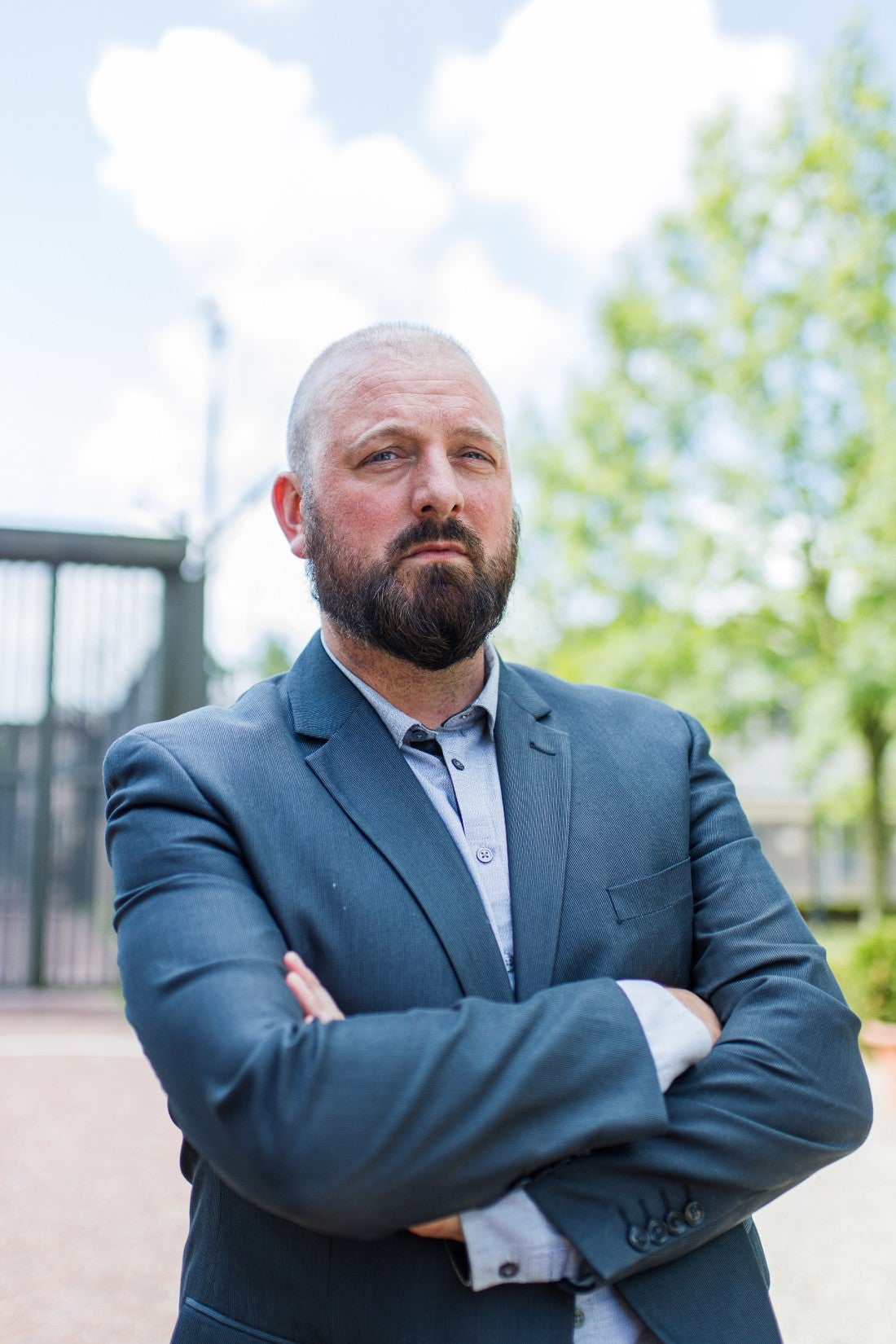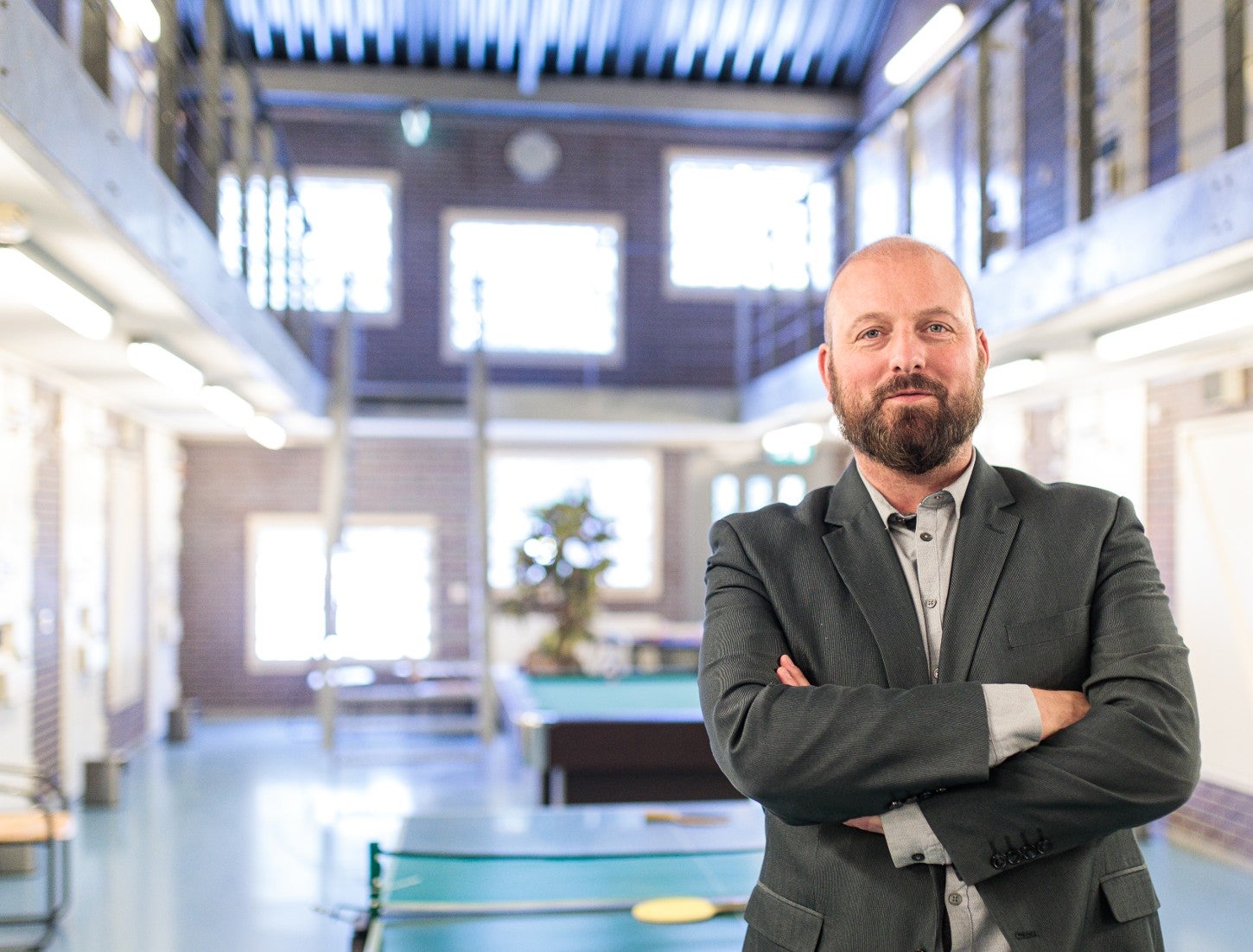As a small boy, Toon Molleman (40) saw his future in the prison service. For this reason, he pursued Policy Studies at VU Amsterdam.
One of the prisons that Molleman is responsible for as national governor is situated alongside the idyllic Loosdrecht Lakes. Relaxed, he walks through the departments in the prison. It’s almost as though he feels at home here. „You can imagine that some detainees feel claustrophobic at first, but the cells really do close at quarter to five."
Prison captures the imagination of many. What kind of questions do you get when you tell people you are governor of prisons in the Eastern Netherlands?
„People often think it is like an American movie, with terrible and bloody incidents happening every day. Of course, we don’t accommodate the easiest of people, but it's not that bad. People also often want to know where the infamous criminals are held, but I keep that kind of information to myself."
„The prison service is a closed sector, and the closed nature of the institution enhances collegiality. In fact, the collective as a whole ensures that you are safe. People are often also unaware that prisons staff in the Netherlands are unarmed. In fact, we assume that we have relational security. In concrete terms, that means being very aware of what is going on. For example, if someone comes from court with a hefty sentence of a few years, then we take that into account. Rather than positioning ourselves in opposition to detainees, we stand side by side with them – with appropriate security measures, of course."
When did you know you wanted to join the prison service?
„I must have been about five years old. My father was a GP, and when my brothers and I were being too boisterous, my mother would regularly send us with him when he made house calls. Sometimes he had to go to the prison. Then he’d walk through the huge entrance gate with his big doctor’s bag. I would sit on the back seat of the car wondering what was going on behind that big fence."
„My education didn’t follow the traditional path from high school to university. After college, I did an internship as a music therapist in a juvenile detention facility. While there, I was introduced to collegiality and unconditionality, and knew for sure: this is where I belong. I feel safer in a prison than on the outside."
You did Policy Studies at VU Amsterdam. What kind of student were you?
„Right from the start, I took my studies very seriously. I attended every conceivable lecture, even Professor Balkenende’s non-compulsory lectures. I sat there just with two other students in the main hall. It was quite a step up from college and I wanted to understand as much as possible about the things I couldn’t find in the books. I also drove a taxi to pay for my studies. So it wasn’t the usual student life with lots of partying and drinking."
„Some interim managers don’t mind what industry they head up. I want to know exactly what’s going on."
„The things I learnt during my studies are still important for the work I do now, but they’re definitely not the only thing. I love being in the workplace. Some interim managers don’t mind what industry they head up. I want to know what’s going on, and I want to understand what everyone’s job in the organisation entails: from prison officers to the cleaner. Also how government actions and policies are drawn up. For a month now, I have been working at the Custodial Institutions Agency (Dienst Justitiële Inrichtingen, DJI) headquarters, which falls under the Ministry of Justice and Security. As one of the few with experience in the workplace, I really have something more to offer."
„Putting boundaries in place when it comes to behaviour is not something you learn in college; I had to experience that first hand."
What posed the biggest challenge when you became governor?
„Putting boundaries in place when it comes to behaviour is not something you learn in college; I had to experience that first hand. As a governor, you have to establish your authority somehow, so you don’t let others walk all over you. Occasionally I have to crack down and put a boundary in place for an inmate. That ranges from a day in the cell without television to two weeks in the isolation cell. Someone might be compliant, but when a inmate is guilty of violence, and particularly toward staff, then a line has been crossed. Things weren’t going well on the outside as it was, whatever the case may be, and now you're in a prison and that’s the end of it."
„I don’t give a damn if I get the middle finger when I walk away, or if someone yells: there’s the fatty with the beard."
„Tomes have been written about management, but they’re of no use to me. It’s about being yourself and acting with authority at certain times. I don’t give a damn if I get the middle finger when I walk away, or if someone yells: there’s the fatty with the beard. I want my staff to feel strong because I support them. That to me is leadership."
And inside the prison: what proved to be different in practice?
„I was quite idealistic when I first started. I thought: we just need to make things more pleasant in here. And why does it all have to be so restrictive? Surely we can show a movie on a big screen every evening, or have a vegetable patch where everyone can garden to their heart's content? Then pretty soon you discover the budget limitations."
„I thought: surely we can show a movie on a big screen every evening, or have a vegetable patch where everyone can garden to their heart's content?"
„And once you’ve been there for a while, you also notice that everything has a downside. There’s a small group that will twist anything you offer in terms of opportunities and privileges to their own end. They ruin it for everyone else. It goes without saying that people have a lot of time to think about how to bend things to their will. Or the stakes are high, such as running a drug trade outside the prison walls. We regularly introduce something only to have to reconsider it a short while later."
„For example, someone’s wife once had a baby on the outside. The wife then visited for the first time with the baby in the visiting room. He asked: surely I should be allowed to hold my baby? Of course, you think, as the benevolent governor. Only to have the staff discover a small package of cocaine stuck to the inside of the baby’s cheek."
Is there anything that still surprises you?
„There was something a couple of weeks ago. A prison officer found a bottle of urine in someone’s cell. That’s not permitted of course. It was most probably clean urine from the neighbour. The prisoner in question was on drugs and thought that this would be a way to pass the urine test. When I confronted him with the bottle, I was told that he had a skin problem and that he took a sip of his own urine every morning as a cure. Then go ahead and drink it, I said, and you won’t be punished. No, no, he was quick to reply. We were both able to have a laugh about it afterwards. That’s better than having a hardliner, who carries on denying it despite rock-solid evidence."

The prison you used to be governor of was the first prison to practise restorative justice, i.e. mediation between offenders and victims. What have your experiences been?
„It’s becoming more popular because it really does work. The thing is, if someone’s daughter is murdered, then it makes no difference if the perpetrator gets locked up for thirty years. It won’t get your daughter back. And your anger doesn’t disappear. Restorative justice can help victims to process their loss, show someone that the guilty party also has a story, even if he did something wrong. This often helps the victim to move on."
„Imagine if you’re still in debt to the tune of two hundred thousand. Shall we try to do something about it? ‘Nope, he or she doesn’t feel like it.'"
„Restorative justice is also positive for inmates. Studying something or taking a course can also help people to focus on the future. If they are already taking a course. For instance, if you are imprisoned for six months to a year, you can get your college diploma, or we can help you to pay back debts. Many more prisoners should take advantage of this."
„Prisoners come with just one label: ‘the length of the sentence’. In court they know what kind of problems that person is facing. Why can’t the judge set individual goals for them? As it stands now, it’s up to the prisoner to decide what they feel like doing. Imagine if you’re still in debt to the tune of two hundred thousand. Shall we try to do something about it? ‘Nope, he or she doesn’t feel like it.’ I sound cynical, don’t I?
Until recently, life imprisonment really meant life imprisonment. But since 2017, life prisoners’ sentences are reviewed after 25 years in prison, with the possibility of release. What do you think of that?
„I support this change in legislation. But I do think that we have to look closely at whether there is any evidence of change and, also, risks have to be mitigated. It has to be observable as well as measurable."
„In practice, there are detainees who make me think: it’s too risky to release these people back into society."
„In practice, there are detainees who make me think: it’s too risky to release these people back into society. They are likely to do something truly awful in no time. Some have no prospects for development, either because they don’t want therapy, or their personality disorder is too complex. And others are not open to change: they refuse therapy, or won’t cooperate with work obligations because they have nothing to lose anyway."
But isn’t it also true that up until 2017, you had nothing to lose because you knew you had no prospects?
„It is not that everyone in this group had given up. Some of them fight on right up to exploring their international legal options and those are procedures that can take many years. Some of them have a ‘screw you’ attitude towards the system and deny everything, despite rock-solid evidence. Looking at yourself in the mirror and seeing a bad person is a difficult thing to do. Because then you have to come to terms with it and change. That is difficult."
„But if someone doesn’t give a damn about anything and doesn’t progress, or can’t progress, that person has no prospects on the outside."
„But a prisoner who has been cooperating well in prison for twenty years, has confessed his guilt, is willing to face victims, has paid compensation and his debts: that person has prospects. First on the inside and later maybe, at some point, on the outside. Fortunately those people do exist. But if someone doesn’t give a damn about anything and doesn’t progress, or can’t progress, that person has no prospects on the outside. That may sound hard, but we do have to serve the safety of society as a whole."






